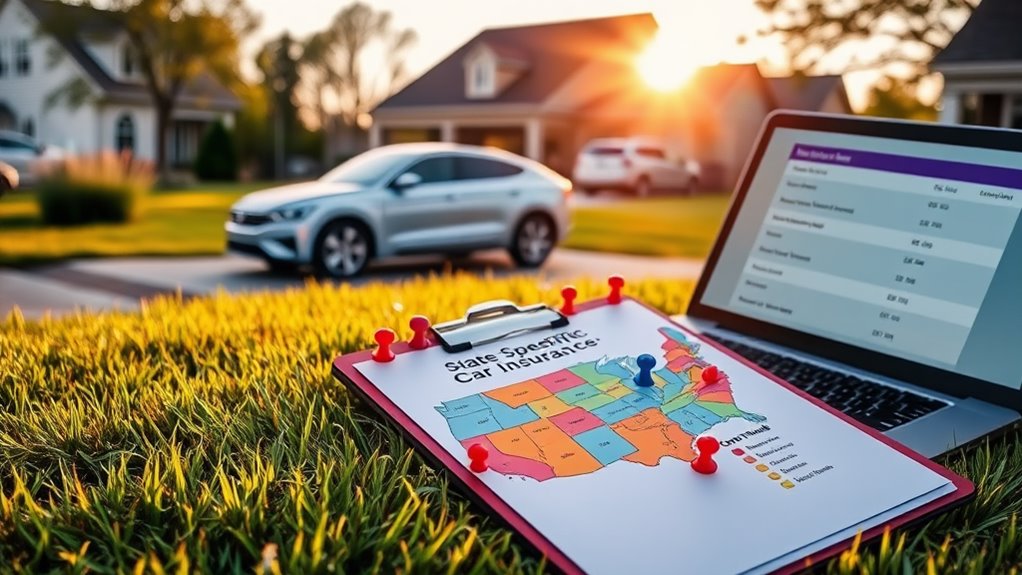When considering car insurance, it's crucial to grasp the specific requirements of your state. Each state has unique minimum liability coverage limits and local factors that can affect your premiums. For instance, urban areas often see higher rates due to increased traffic. Additionally, maintaining a clean driving record can improve your options considerably. Understanding these nuances can lead to smarter choices—and there are more strategies that could save you money.
When it comes to car insurance, understanding the various coverage options and factors that influence your premium can save you both time and money. Each state has its own unique requirements and regulations that can greatly affect your insurance needs and costs. By familiarizing yourself with these state-specific considerations, you can better tailor your policy to fit your situation, guaranteeing you're adequately protected while avoiding unnecessary expenses.
First, it's essential to know the required coverage in your state. Most states mandate a minimum level of liability coverage, which pays for damages you cause to other parties in an accident. However, these minimums vary greatly. For instance, New York has some of the highest minimum liability requirements, while other states may have far lower limits. Understanding these requirements not only helps you meet legal obligations but also guarantees that you're adequately protected against potential liabilities. Additionally, non-owner car insurance is an option for those who frequently drive vehicles they do not own, providing coverage in such situations.
Next, reflect on how local factors influence your insurance rates. Urban areas typically have higher traffic density, which correlates with increased accident rates. Consequently, if you live in a city, expect to pay higher premiums than someone in a rural area. Additionally, reflect on local regulations and how they might impact your premium. States with higher incidences of natural disasters may necessitate extensive coverage, which protects against non-accident damages like theft or weather-related losses. Moreover, approximately 215 million drivers in the U.S. carry car insurance, illustrating the vast number of insured vehicles and the competition among insurers.
Your driving history also plays a key role in determining your premium. If you have a clean record with no accidents or violations, you're likely to benefit from lower rates. However, if you've had past claims or traffic violations, expect your premiums to be higher. As you shop for insurance, maintain a focus on your driving behavior, as it directly affects the risk assessment performed by insurers.
When comparing quotes, don't overlook potential discounts available in your state. Many insurers offer multi-vehicle discounts for those insuring multiple cars, or bundling discounts for combining auto and home insurance policies. Additionally, completing a defensive driving course might earn you a reduction in your premium. Even your credit score can impact your rates, as many states allow insurers to reflect on this factor when calculating premiums.
Lastly, make certain to research the financial stability and customer service reputation of potential insurers. A company's claims processing efficiency and customer satisfaction can greatly affect your experience during a claim. Look for reviews or ratings from past customers to gauge how well an insurer handles claims and customer inquiries.
Conclusion
Maneuvering state-specific car insurance is like steering through a winding road—each turn reveals unique requirements tailored to your location. By understanding your state's minimum coverage, considering local factors, and keeping your driving record spotless, you can access a wealth of options. Don't forget to explore discounts that can cushion your wallet. In the end, being informed and proactive will help you drive confidently, knowing you're adequately protected while saving money along the way.
